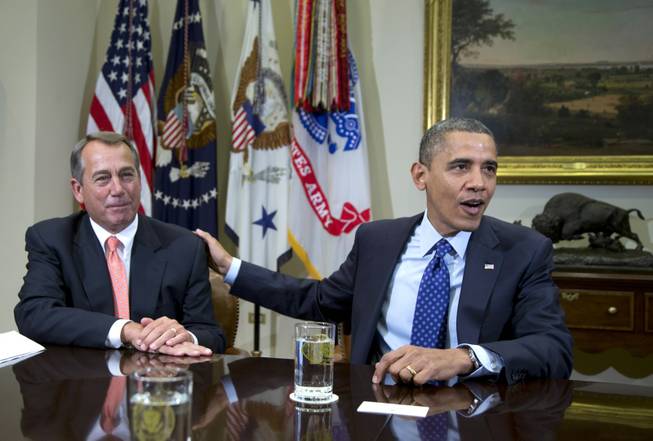
Carolyn Kaster / AP
President Barack Obama acknowledges House Speaker John Boehner of Ohio while speaking to reporters in the Roosevelt Room of the White House in Washington, Friday, Nov. 16, 2012, as he hosted a meeting of the bipartisan, bicameral leadership of Congress to discuss the deficit and economy.
Thursday, Dec. 20, 2012 | 2 a.m.
Related stories
- Also teetering on the cliff: An extension of emergency unemployment benefits (12-20-2012)
- Obama, Boehner riding out ‘fiscal cliff’ negotiations, but Harry Reid may control the wheel (12-19-2012)
- A practical guide to the fiscal cliff: What it could mean for your taxes (12-19-2012)
- Boehner pitches Republicans tax options to avoid ‘fiscal cliff’ (12-18-2012)
- Narrow ‘fiscal cliff’ bargain gains currency (12-18-2012)
- As fiscal cliff nears, Reid says Democrats are gaining ground (12-13-2012)
- Night talks: Obama, Boehner meet on ‘fiscal cliff’ (12-13-2012)
- More Sun political news
On Thursday, the House of Representatives will take the first vote in what was supposed to be a final push toward a "fiscal cliff" compromise.
Instead, the vote will serve as the opening gambit in the latest round of fiscal one-upsmanship that has preoccupied Congress for two years and now may pitch the country over the fiscal cliff.
Speaker John Boehner is gearing up to have the House vote on a fiscal cliff package Senate Majority Leader Harry Reid already said he would gut in the Senate and President Barack Obama already threatened to veto.
The opening salvo, Plan B, is fairly simple: It would extend current tax rates for all income levels up to $1 million, allowing taxes on income earned above that level to rise from 35 percent to 39.5 percent, and increase the capital gains tax from 15 to 20 percent.
“On average, millionaires would see a tax break of $50,000, while eliminating tax cuts that 25 million students and families struggling to make ends meet depend on,” White House Communications Director Dan Pfeiffer said in his explanation of Obama’s veto threat Wednesday. “The deficit reduction is minimal and perversely, given its authors, solely through tax increases with no spending cuts. This approach does not meet the test of balance.”
Boehner presented Plan B to Republicans on Tuesday as an alternative to a tax, debt ceiling and debt reduction plan Obama presented to Boehner during negotiations. That plan would have capped tax rate extensions at $400,000, raising about $1.3 trillion in revenue, and paired that with increased authority to raise the debt ceiling and almost a trillion dollars in cuts that include paring back Social Security payments for recipients who are not indigent.
These past 48 hours, Boehner was supposed to be presenting Obama’s plan, along with his Plan B, to the House Republicans to find out how many would be willing to vote in favor of either. He also was supposed to be counting votes in favor of a proposal to cap tax cut extensions at $250,000, a plan that has earned the support of Senate Democrats but not yet picked up a single Republican vote.
The $250,000 bill could potentially pass the House with only a few dozen Republican votes, as it is the bill preferred by most House Democrats, including Nevada Rep. Shelley Berkley. House Democratic Leader Nancy Pelosi has threatened that Democrats would not help pass Boehner Plan B.
Still, it took barely one day for Boehner to pull every alternative save for his $1 million, Plan B bill — now the only proposal House lawmakers will vote on Thursday evening.
While most lawmakers, including Nevada’s two Republican representatives, aren’t showing their hand, it’s likely Boehner will be able to retain enough Republican votes to pass his Plan B bill by a simple majority — despite some conservative groups coming out against it. The Club for Growth spent most of Wednesday in an indirect sparring match with Grover Norquist’s Americans for Tax Reform, with the club arguing that Plan B was a tax hike for millionaires, billionaires and investors. Norquist's group maintained that because tax cuts would expire absent any congressional action, a vote for Plan B would not violate the tax pledge most Republican lawmakers have taken.
But the bill is still dead on arrival in the Senate.
Democrats, even those who supported a similar bill to increase taxes on only millionaires two years ago, are holding rank and insisting that Republicans require high-wage earners to pony up more in taxes between the $400,000 and $1 million income levels.
“If Democrats disapprove of this bill, then there is a simple solution,” Boehner spokesman Brendan Buck said Wednesday. “Amend it in the Senate and send it back to the House.”
Reid indicated Tuesday he already was preparing for that scenario and additional back-up options, depending on what does or doesn't emerge from the House by Thursday night.
But unless the dawning of a new Mayan age on Friday brings new camaraderie to the relations between the two congressional bodies, it’s difficult to see how the House and Senate then find a middle ground between the Democratic proposal Republicans have rejected as “unbalanced” and the Republican proposal Democrats have rejected as unfair.
Not even the president could offer a note of optimism Wednesday, when reporters asked him if the country would, in fact, be going over a fiscal cliff.
“There’s no reason why we should,” the president said before launching into a lengthy explanation of why Boehner and his Republicans should “take the deal” Obama proposed.
That would be the same one they will be tacitly rejecting during Thursday’s vote.

Join the Discussion:
Check this out for a full explanation of our conversion to the LiveFyre commenting system and instructions on how to sign up for an account.
Full comments policy